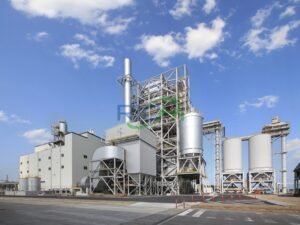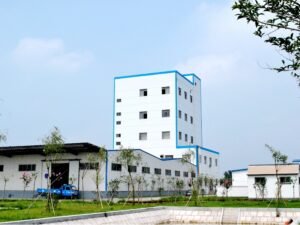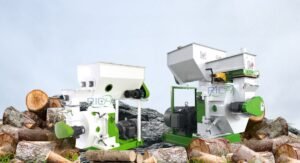
As the world continues its transition towards renewable and sustainable energy sources, Germany has emerged as a leader in the adoption of biomass heating solutions. At the forefront of this movement is the wood pellet industry, which has witnessed remarkable growth and innovation in recent years. Central to this thriving sector are wood pelletizers – specialized machines designed to transform various forms of woody biomass into dense, energy-rich pellets.In Germany, the demand for high-quality wood pelletizers has surged, driven by the country’s commitment to reducing its carbon footprint and promoting sustainable practices. With a rich history of engineering excellence and a strong focus on environmental stewardship, German manufacturers have established themselves as pioneers in the production of efficient and reliable wood pelletizers.
The Rise of Wood Pellet Heating in Germany
Germany’s embrace of wood pellet heating can be attributed to several factors, including favorable government policies, rising fossil fuel prices, and a growing awareness of the environmental impact of traditional heating methods. The German government has implemented various incentives and regulations to encourage the adoption of renewable energy sources, such as the Renewable Energies Heat Act (EEWärmeG) and the Market Incentive Program (MAP).These initiatives have not only driven consumer demand for wood pellet heating systems but have also fueled the growth of the wood pellet production industry, creating a thriving market for wood pelletizers. As a result, Germany has become one of the largest producers and consumers of wood pellets in Europe, with a production capacity of over 3.2 million tons per year and a consumption rate of approximately 1.2 million tons in the heating market alone.
Key Considerations When Purchasing Wood Pelletizers in Germany
When exploring wood pelletizer for sale in Germany, prospective buyers should consider several key factors to ensure they select the most suitable machine for their specific needs and requirements:
- Production Capacity: Determine the desired production capacity based on your anticipated demand for wood pellets. German manufacturers offer a wide range of wood pelletizers, from small-scale units suitable for residential or farm use to large-scale industrial systems capable of producing thousands of tons of pellets per year.
- Feedstock Compatibility: Evaluate the compatibility of the wood pelletizer with the specific types of woody biomass you plan to use as feedstock. Different machines may be better suited for processing materials such as sawdust, wood chips, bark, or agricultural residues.
- Energy Efficiency and Sustainability: Prioritize wood pelletizers that incorporate energy-efficient technologies and sustainable practices, such as waste heat recovery systems, variable frequency drives, or the ability to integrate renewable energy sources.
- Automation and Control Systems: Assess the level of automation and control systems offered by the wood pelletizer. Advanced features, such as programmable logic controllers (PLCs), human-machine interfaces (HMIs), and remote monitoring capabilities, can improve process efficiency, consistency, and quality control.
- Maintenance and Support: Consider the manufacturer’s reputation for quality, after-sales support, and availability of spare parts and technical assistance. Proper maintenance and support are crucial for ensuring the longevity and optimal performance of the wood pelletizer.
- Regulatory Compliance: Ensure that the wood pelletizer complies with relevant German and European regulations, standards, and certifications related to emissions, safety, and environmental protection.
Sourcing Wood Pelletizers in Germany
Germany is home to several renowned manufacturers and suppliers of wood pelletizers, offering a wide range of options to cater to diverse market needs. Prospective buyers can explore the following sourcing channels:
- Direct Manufacturer Contacts: Reach out directly to German manufacturers of wood pelletizers, such as KAHL Group, MÜNCH-Edelstahl GmbH, and CPM Europe GmbH. These companies often provide comprehensive product information, technical support, and customization options.
- Industry Events and Trade Shows: Attend industry events and trade shows in Germany, such as LIGNA, EuroTier, or IFAT, where manufacturers showcase their latest wood pelletizer models and technologies. These events offer valuable networking opportunities and hands-on product demonstrations.
- Online Marketplaces and Auctions: Explore online marketplaces and auction platforms that specialize in industrial equipment, including wood pelletizers. These platforms can provide access to a wide range of new and used machines from various sellers.
- Equipment Brokers and Dealers: Consider working with reputable equipment brokers and dealers who specialize in sourcing and reselling industrial machinery, including wood pelletizers. Their expertise and industry connections can facilitate the procurement process.
The Impact of Wood Pelletizers on Germany’s Sustainable Heating Goals
The adoption of wood pelletizers and the subsequent production of wood pellets have played a crucial role in supporting Germany’s sustainable heating goals and environmental commitments. By leveraging the country’s abundant forestry resources and wood processing waste, the wood pellet industry contributes to several key objectives:
- Reduced Dependence on Fossil Fuels: Wood pellets provide a renewable and locally sourced alternative to fossil fuels, reducing Germany’s reliance on imported energy sources and contributing to energy security.
- Greenhouse Gas Emission Reductions: The combustion of wood pellets is considered carbon-neutral, as the carbon dioxide released during burning is offset by the carbon absorbed by the trees during their growth cycle. This aligns with Germany’s emission reduction targets and efforts to mitigate the impacts of climate change.
- Economic Opportunities and Job Creation: The establishment of a robust wood pellet industry has created new economic opportunities and jobs, particularly in rural areas, supporting sustainable development and promoting inclusive economic growth.
- Waste Utilization and Resource Efficiency: By converting wood waste and residues into valuable energy sources, wood pelletizers contribute to improved resource efficiency and waste management practices within the forestry and wood processing sectors.
As Germany continues to lead the way in sustainable energy solutions, the availability of wood pelletizers for sale presents a promising opportunity for businesses, entrepreneurs, and energy providers to contribute to the country’s renewable energy transition while promoting economic growth and environmental stewardship.
Related post: https://www.richipelletmachine.com/wood-pellet-making-machine-price/






